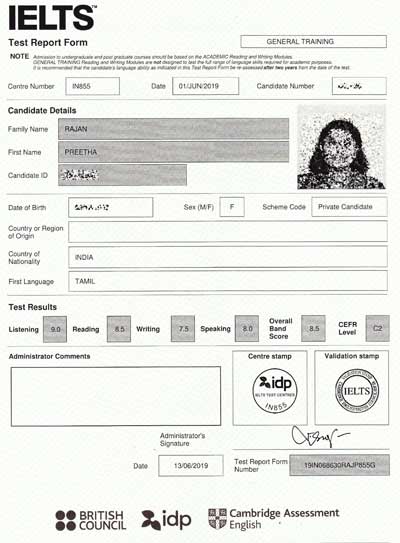Since the beginning of time students of any class or course, anywhere and everywhere in the world, have been doing the same two things: sharing course notes and swapping exam tips, and the reason why is… Because it works!
For the exact same reason we have a tradition where high scoring test takers who won in our monthly IELTS results competition share their notes and tips with people who visit IELTS-Blog.com while preparing for their exam.
Today we are delighted to introduce to you Preetha – a very kind and generous young lady from India whose mother tongue is Tamil. Preetha got an Overall Band 8.5 in IELTS with 9.0 in Listening, 8.5 in Reading, 8 in Speaking and 7.5 in Writing, and she was preparing on her own, at home – so she obviously has done a lot of things right!
Below are the strategies that Preetha used while studying for IELTS. If anything in your exam preparation isn’t going as well as you’d like, try Preetha’s approach and see if you start scoring higher!

General Advice
I would like to begin by saying, always approach the IELTS test with a positive frame of mind. This is critical. In fact, try to enjoy the entire test-taking process as much as you can.
Also, regular practice is crucial. By “regular practice” I mean attempting at least two practice tests a day, once you get familiar with the pattern of the test (which will probably take a month or so, if you are completely new to IELTS).
Try taking practice tests from a variety of sources, not just from the official Cambridge IELTS books. Once you are comfortable with the format of the test, start exploring online practice tests.
Remember to not shy away from practicing difficult tests, during the later stage of your preparation. Practicing challenging tests can go a long way in boosting your confidence!
If you do not get the target score you want while taking these practice tests, do not get discouraged. As the old saying goes: “If at first you don’t succeed, try, try, and try again.” Try to analyze your mistakes instead. For instance, ask yourself “Why did I interpret this sentence in this way?” Answer keys will help you in this regard.
Towards the end of your preparation, try to replicate typical IELTS test conditions. By this, I mean mastering the art of taking a listening, reading and writing test one after the other, without breaks in between. Yes, that means no meal, snack or bathroom breaks. Try to make sure that you utilize the entire time allotted for the test.
Do not attempt practice tests on the day before the actual test. It will only stress you out. Get adequate rest.
Here are my strategies for each section of the test. These strategies will be useful to IELTS paper based test takers.
Listening
You need to learn to “anticipate the answer” while the recording is playing. This can only be achieved through tons of practice. For example, if the first recording is a “day to day” conversation, such that a question involves noting down a customer’s telephone number, pace yourself slightly ahead of the recording, and as soon as the customer service representative says something like “I need some contact information from you…”, get ready to listen in for the answer in the recording. This is the art of “anticipating the answer.” Do not overthink things. Be alert at all times.
Before the recordings begin to play, read the question paper thoroughly. This is critical, as the recordings get progressively difficult. By looking at the question paper, analyze in your mind, the kinds of recordings that you have to work with, before the test begins. This will help you decide whether to take notes for tricky listening passages like conversations between students, or between students and their professors at University, or map-based questions. Such types of listening passages are tricky, as just when you think you have the answer from the recording, the speaker might change his mind (like in a real life conversation) and hence, the answer might be something quite different than anticipated. Notes should always be in the form of hints as to what the answer to a question might be. You need to take down notes carefully with lightening speed, so that you don’t get distracted and miss listening to the rest of the recording.
Reading
Just like with the Listening test, be sure to read the question paper with utmost care in the Reading test. Do not hesitate to underline key words and sentences in the passage. Make notes too, regarding your interpretation of the meaning of words, sentences or maybe even entire paragraphs.
Time management is critical here. During my test, I had to tackle five passages in 60 minutes. Manage your time effectively by allocating 20 minutes to answer questions from passages that are academically oriented (such passages can be on topics from History, Literature, Science subjects, etc.). It is important that you complete these types of passages first, to avoid stressing out and rushing through the rest of the test! Here, the technique of skimming and scanning will come in handy. For instance, for questions that ask you to match a specific paragraph with an appropriate title, you will need to get the gist of each paragraph. Do not attempt to read an entire paragraph. You will waste precious time! Instead, stick to reading only the first and last sentence of a specific paragraph (or may be at most, the first two sentences and last two sentences) to get the gist of it. Perhaps even underline some keywords, as sometimes such keywords may appear in the title options for a specific question!
Also, throughout the test, adopt the following attitude: “I am going to replicate exactly what I read in each passage. The information will either be contained in the passage or will be totally missing (this motto is especially important for the tricky True/False/Not Given questions). Overthinking and second guessing are my enemies.”
Writing
Again, time management is critical. Always complete task 2 first. Allocate 40 minutes for task 2 and 20 minutes for task one. Remember that IELTS essays are not fact-checking essays! Some people make the mistake of cramming too much information into an IELTS essay and in the end, neglect to check on critical aspects such as grammar and punctuation, due to poor time management! The examiner is not concerned about reading in-depth information on a certain topic. He/she just wants to assess your ability to construct an argument (for instance, being for and against something) and backing up your argument with real life examples (for instance), along with critical language-related aspects such as vocabulary choices, spelling, grammar, etc. Do not attempt an IELTS essay in a university-oriented language. Think of it as an essay that you are writing for your high school English teacher.
Speaking
To me, this part of the test was the most relaxing. Think of this as a casual conversation with a fellow human being. Do not try to memorize things and blurt them out during the test. Examiners have ways of finding out if candidates have memorized parts of their speeches. Remember to speak as naturally as possible. Also, don’t worry if the examiner interrupts you while you are speaking. This is just part of the proceedings. Also, the speaking test is not a fact-checking test. The examiner is not testing your knowledge on a specific topic. All he/she does is meant to assess the range of your vocabulary and grammar and whether or not you have the ability to speak in a clear and concise fashion without halting.
Well, this is pretty much all the advice I have. I wish all the future IELTS test takers the very best of luck!
Our heartfelt thanks to Preetha for providing this advice and congratulations on doing so well in IELTS!
https://ift.tt/2OuRThD
from IELTS-Blog https://ift.tt/2YgUyji
via IFTTT




